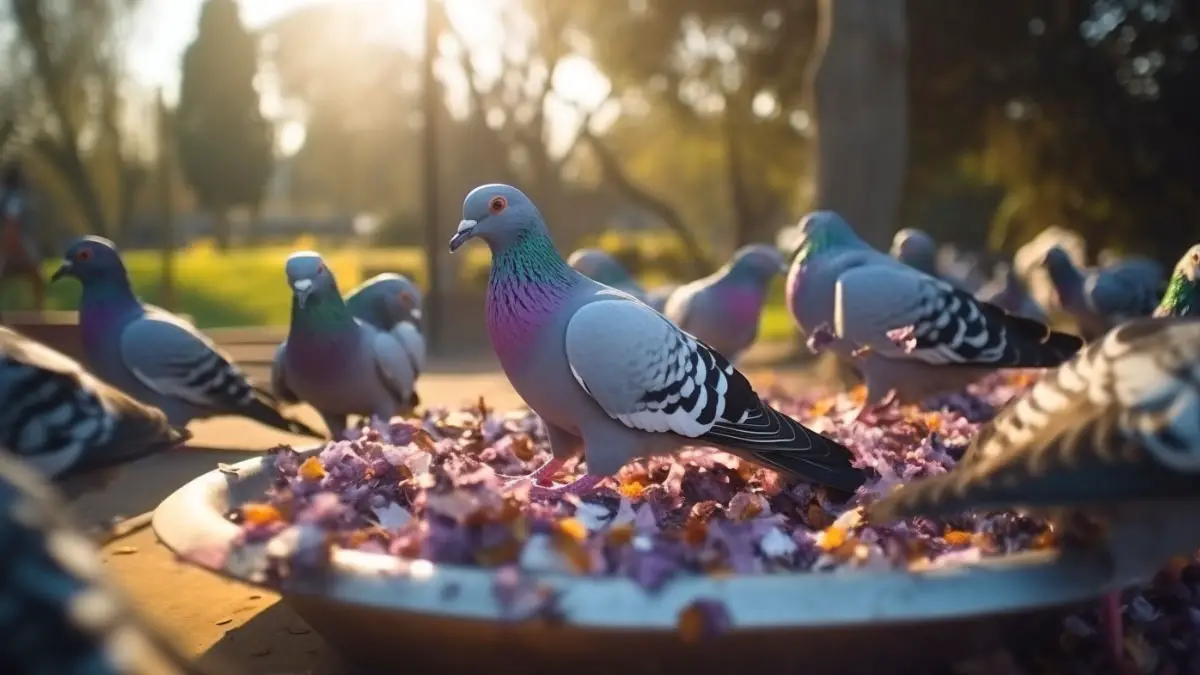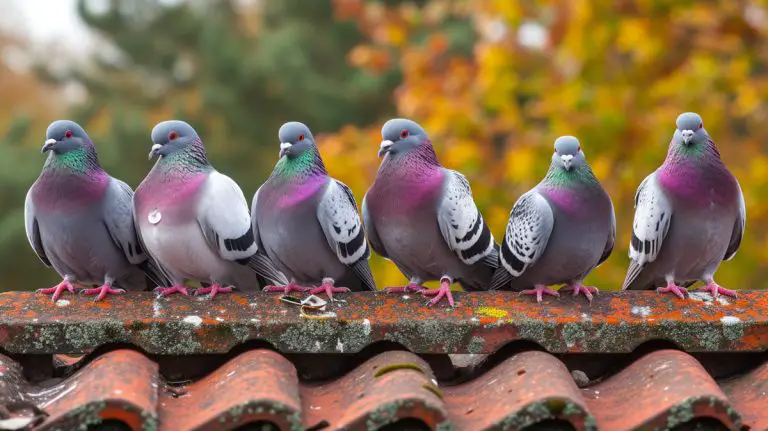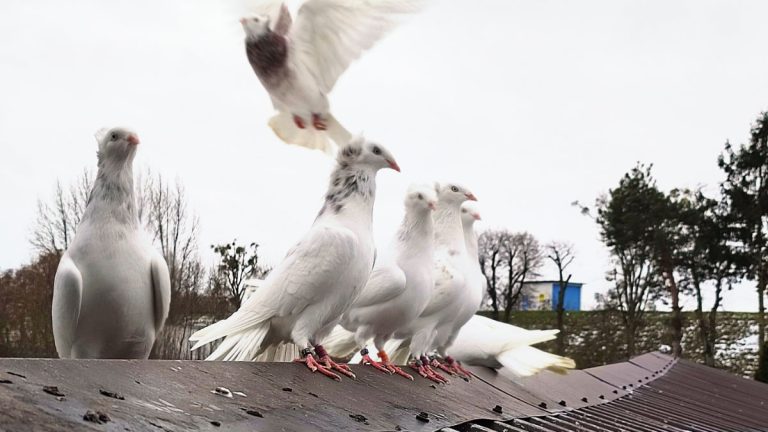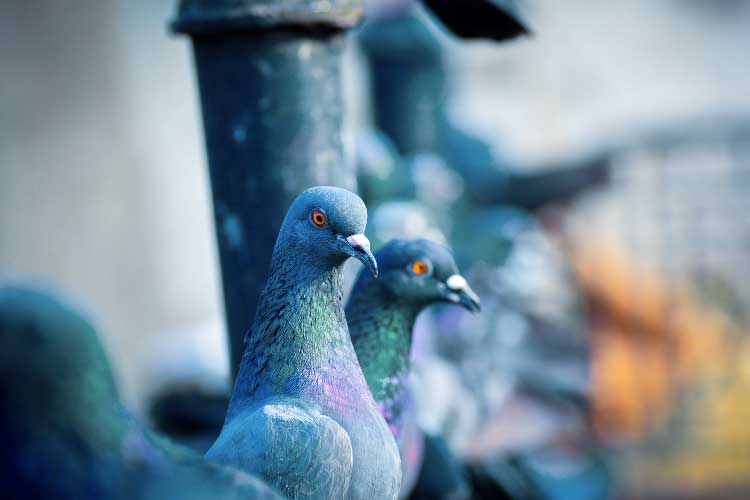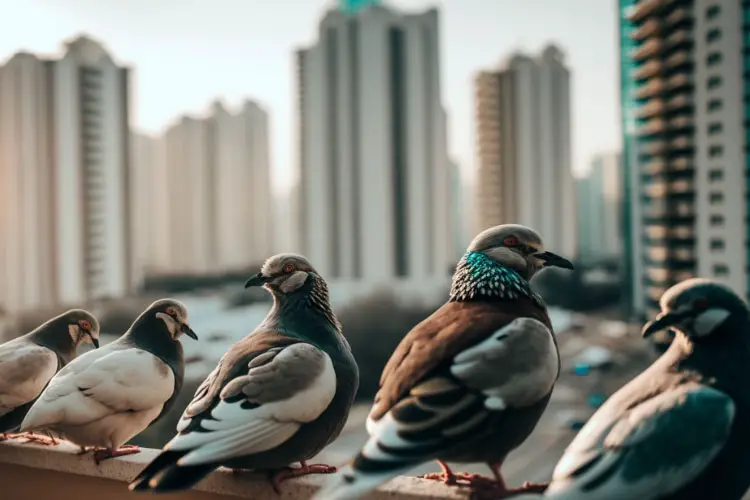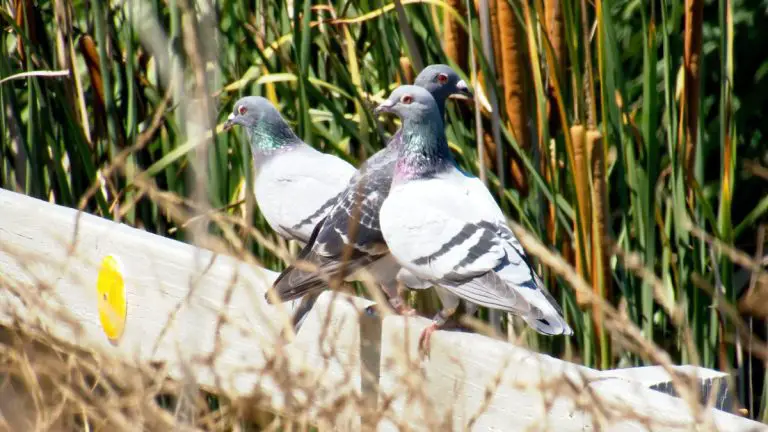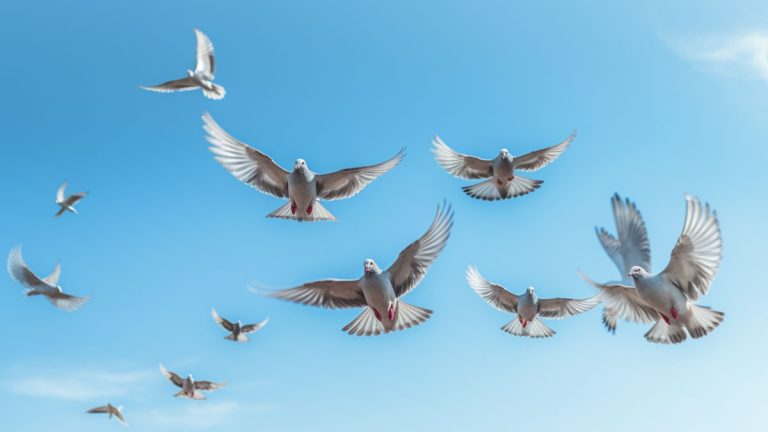What Do Pigeons Eat? A Complete List
Have you ever wondered what the pigeons you often spot in urban settings, parks, and city squares eat? Or are you planning to get some pigeon pets and wondering what you’ll be feeding them? If yes, this guide will help you out. We’ve researched more about pigeons’ diet and found helpful information that we will share with you in this guide.
What do pigeons eat? Pigeons’ primary diet consists of seeds and grains. Their diet may also include fruits and vegetables as these contain additional essential nutrients such as minerals and vitamins. Pigeons in the wild also occasionally eat insects, fruits, and vegetables. These birds also need access to clean and fresh water to stay hydrated.
In this article, we’ll delve into deeper details about what pigeons eat. We’ll discuss what pigeons eat in the wild, what to feed baby pigeons, and what pigeons drink. Whether you’re looking to get your first set of pigeons or are just curious about pigeons’ diet, this guide will give you insights into the bird’s dietary habits and help you raise healthy and strong birds.
What do Pigeons Eat?
If you have pigeon pets, then it’s crucial to feed them proper nutrition to keep them healthy and free from various health problems.
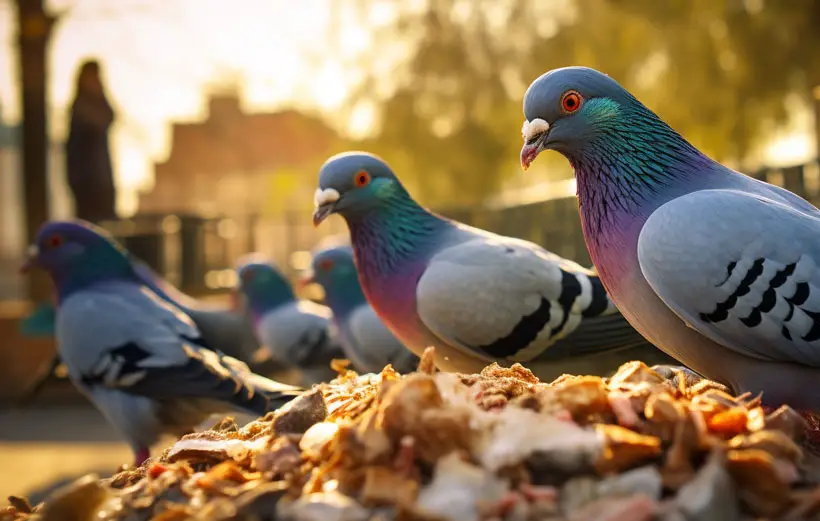
Here’s the list of foods to feed your pet bird to ensure proper nutrition:
Seeds and grains
The primary diet for pigeons is an all-seed diet. Even pigeons in the wild mostly feed on seeds as their primary diet. Seeds and grains are crucial for these birds as they offer them carbohydrates, dietary fiber, and proteins.
Some of the most common types of seeds and grains eaten by pigeons include barley, wheat, sorghum, millet, coats, corn, flaxseed, and rice.
Today, there are commercially available seed mixtures for pet pigeons (usually containing 2-5 different kinds of seeds).
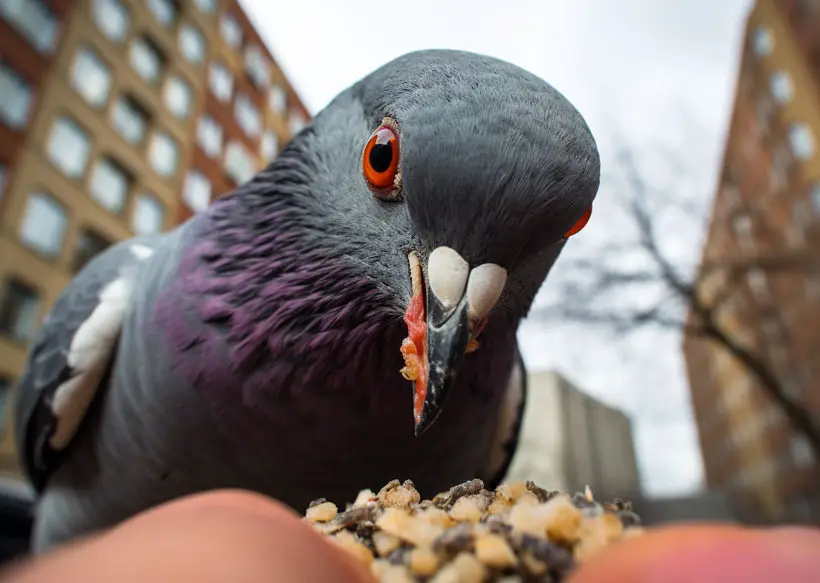
However, it’s worth noting that these seeds are nutrient deficient, high in fats, and aren’t the same kind of seeds as those eaten by birds in the wild. Seeds also lack vital nutrients such as Vitamin A, Calcium, and various other nutrients.
As such, if you feed your pet birds a seed diet only, it may develop health issues, which can cut short its lifespan.
Instead of a seed-only diet, you should look for pigeon foods that contain seeds plus grains. Some food types also come enriched with vitamins and minerals plus brewer’s yeast.
Different formulations are also available for different pigeon breeds, including racing and performance birds, breeding birds, and resting birds.
Fruits and vegetables
You should also feed your pigeons with fruits and vegetables as part of their diet. Fruits will provide the birds with essential nutrients like minerals, vitamins, and fiber.
However, not all fruits and vegetables are safe for pigeons to eat. For instance, vegetables containing high water content, e.g. celery, head lettuce, etc., contain quite low nutritional value and should be avoided.
Fruits like avocados are also said to be potentially toxic to the birds and should be avoided.
When feeding these types of foods to your pigeon, we advise you to first clean them thoroughly to get rid of any chemicals present.
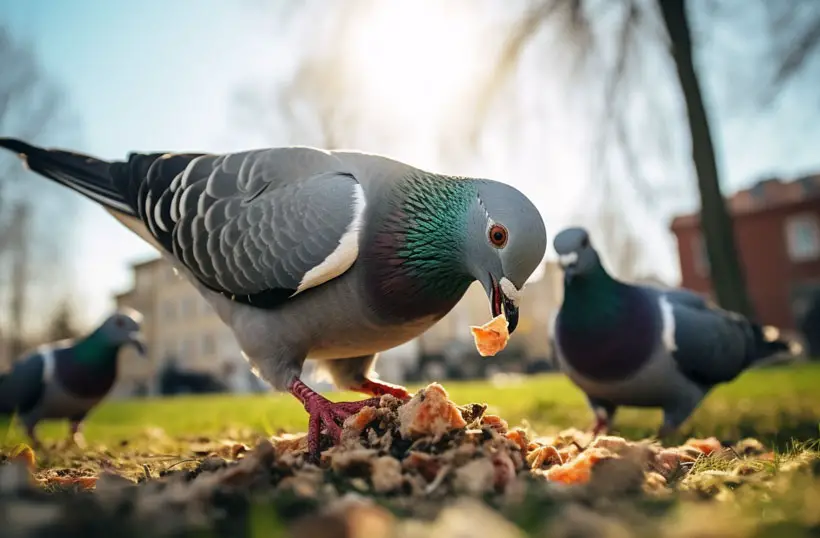
You should also finely chop them into tiny and easily manageable pieces for your birds. This is because pigeons have small beaks and large pieces may be challenging for them.
Make sure you offer the fruits and veggies in a separate dish from the seeds and grains.
Avoid overfeeding your pet bird with one type of fruit or vegetable.
If the bird seems to develop a fancy for a particular type of food, we advise you to reduce its volume or even temporarily stop feeding it.
This will help ensure the bird consumes other types of foods as well.
Water
Like any other animal, pigeons also need to stay hydrated at all times. As such, you will also need to ensure they have access to clean and fresh water at all times.
If you’re unsure about the quality of your tap water, you may consider feeding your birds bottled water.
Still at it, ensure you thoroughly wash the water dish every day with soap and water for the sake of your bird’s health.
Pelleted diet
There are commercial pellet foods specially formulated to meet all the nutritional needs of a pigeon.
If you have hand-raised baby pigeons, we advise you to start them on this type of diet.
Overall, if you go with pellet food for your pigeons, make sure it makes up 50% of their diet while the rest comprises small amounts of fresh produce and seeds.
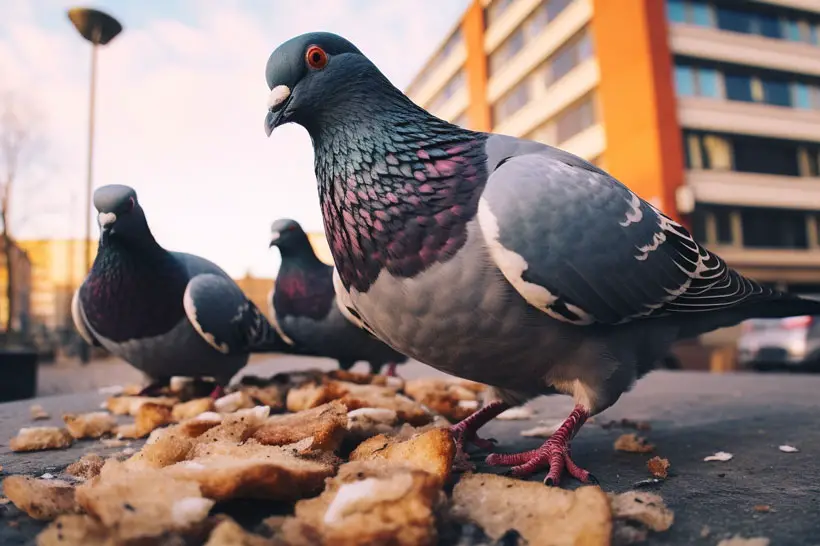
IMPORTANT: You can also feed your pigeons the food you and your family eat. However, there are exceptions. You should only feed them wholesome and nutritious food. Feed them in small quantities.
Avoid any junk foods, salty foods, chocolate, caffeinated products, and alcoholic beverages. All these can be toxic to your birds and should be avoided completely.
What do Pigeons Eat in the Wild?
Pigeons in the wild also have their specific diet, just like their domesticated counterparts. Generally, these birds belong to the family Columbidae, so their natural diet in the wild primarily consists of grains and seeds.
They also occasionally eat other food types like fruits, berries, greens, and insects. The grain-based diet is essential in providing them with the necessary energy for daily activities such as courtship displays, foraging, flight, etc.
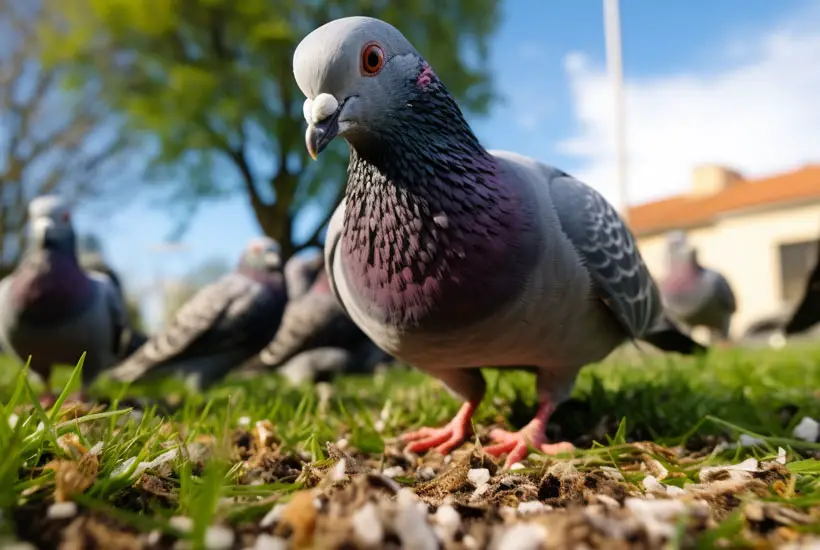
Wild pigeons are omnivorous and feed on insects as well. These provide them with proteins and other essential nutrients to help them maintain their energy levels and grow. The birds will occasionally catch and eat insects, earthworms, and snails on the ground.
As for the feral legions that you usually spot in the city squares, parks, and other urban and suburban settings, they have a wide range of food sources. This means their diet consists of more than just seeds and grains.
The most common foods for these pigeons include birdseed, grains, fruits and vegetables, insects, nuts, bread, and human food scraps.
What do Pigeons Eat in the Winter?
During the winter season, pigeons tend to adjust their diet to cope with the cold weather and the issues of food scarcity.
They continue eating the same type of food they eat at other times of the year, including seeds, grains, nuts, insects, etc.
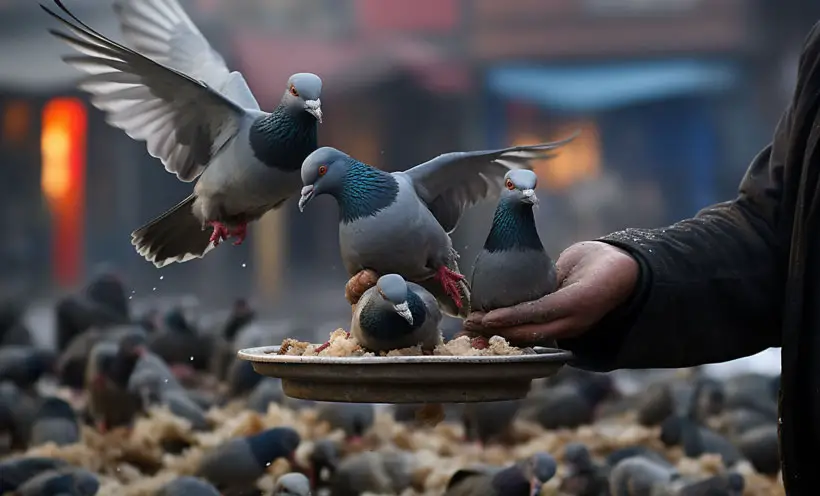
These foods help provide them with carbohydrates and fats to help maintain their energy levels.
Pigeons in urban areas may scavenge for human food scraps such as bread and other food items more frequently.
If there are any bird feeders available, these pigeons may also compete with other birds for birdseed.
Do Pigeons Eat Rice?
Pigeons can eat rice and it’s even part of their natural diet in the wild. We advise you to feed your pigeons with uncooked rice as it’s nutritious and safe for the birds. We also advise you to feed it to your birds in moderation as part of a balanced diet.
Remember pigeons also require a variety of other foods to meet their nutritional needs and stay healthy. Adding rice as part of your homemade pigeon seeds and grain mixture is recommended.
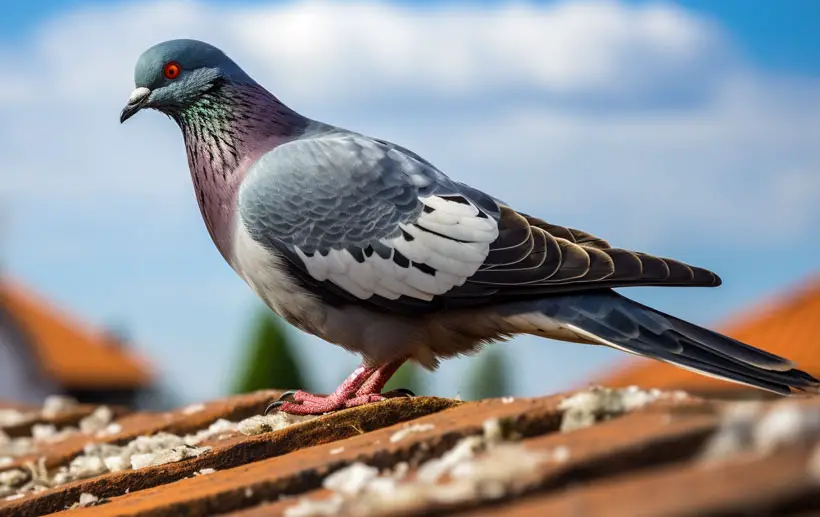
Can Pigeons Eat Bread?
Pigeons can also eat bread but in moderation. Bread isn’t toxic for these birds, but it lacks the essential nutrients these birds require to stay healthy.
Therefore, giving them bread in excess can lead to malnutrition and various health problems.
You should focus on feeding your pigeons a more balanced diet as we discussed earlier in this guide.
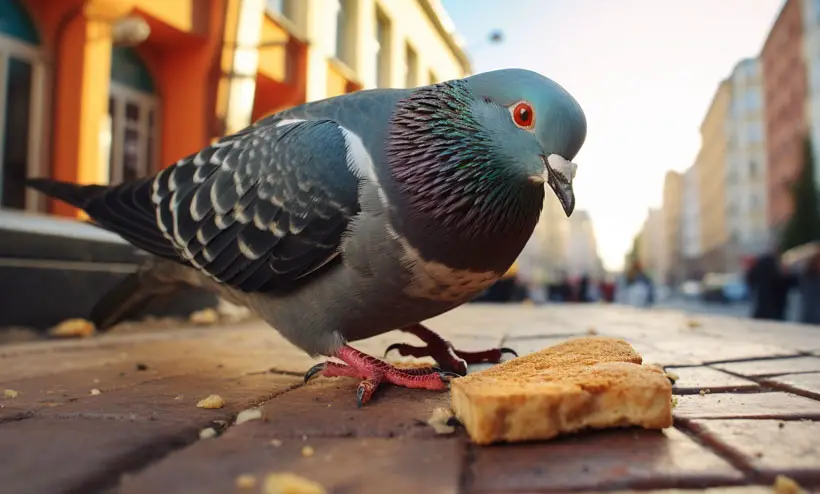
What do Baby Pigeons Eat?
Baby pigeons are known to feed on “pigeon’s milk”, a semi-solid regurgitated substance that is rich in fats and proteins to help promote the growth of the squabs to full size.
Baby pigeons usually consume this special diet in the first days or weeks of their life before they are gradually weaned to be able to eat seeds and other foods eaten by adults.
Note that it may take baby pigeons several weeks before they can start digesting adult food.
But once they do, you can start feeding the adult food varieties we have discussed earlier. These include seeds and grain, fruits and veggies, and a pellet diet. Not to forget clean and fresh water.
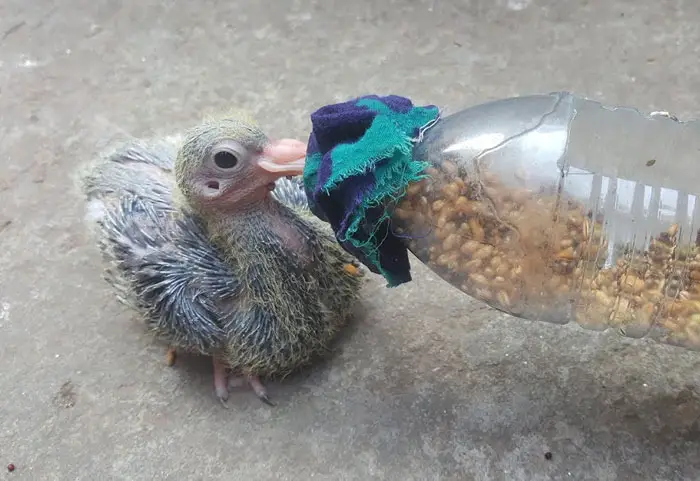
What do Pigeons Drink?
Pigeons require clean and fresh water as their main source of hydration. This applies not only to domestic pigeons but also to wild pigeons.
If you have pet pigeons, you should ensure they have access to clean and fresh water at all times.
You should also clean their water dish every day with soap and water to ensure your birds stay healthy.
Wild pigeons have many sources of clean and fresh water including rivers, ponds, lakes, puddles, etc.
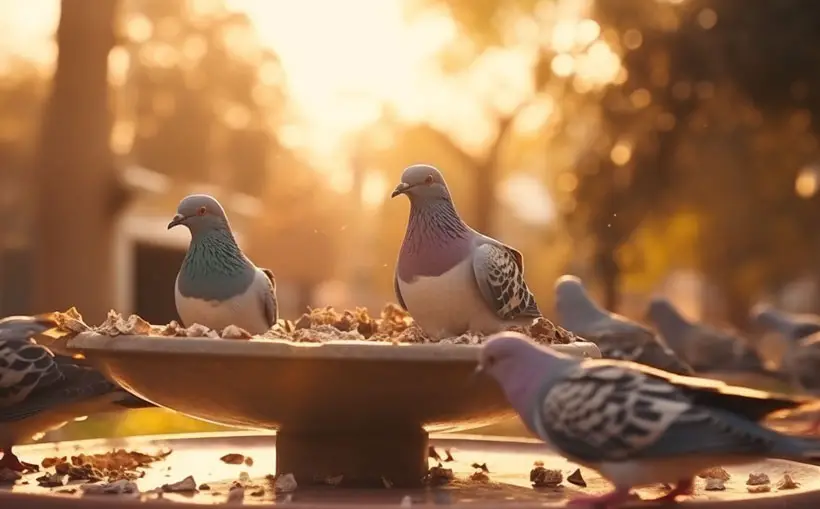
Others may drink from artificial water sources such as birdbaths, fountains, water troughs, or man made water sources such as water pipes, open containers, drains, etc.
However, you should avoid giving your pigeons soda or any other sweetened beverage. You should also not give them coffee or tea.
These types of drinks aren’t natural components of the pigeon diet and may lead to various health complications.
Likewise, avoid feeding milk to your pigeons. Birds are generally lactose intolerant and feeding them milk or dairy products may disrupt their digestive system and potentially kill them.
FAQs:
Foods to avoid feeding pigeons include all processed foods such as chips, sugary foods, and heavily seasoned foods. You should also avoid feeding the birds moldy or spoiled food, any caffeinated products, chocolate, garlic, onions, avocados, salty foods, and alcoholic drinks.
Some vegetables that pigeons can eat include cauliflower, cabbage, squash, broccoli, squash, bok choy, and leafy green veggies. However, these foods shouldn’t be part of their main diet and should be fed to them in moderation.
A pigeon can eat a wide variety of fruits including plums, blueberries, cherries, grapes, apples (with the seeds removed), raisins, strawberries, kiwi, and pears. Again, you should only feed these fits to your pet birds as occasional treats and not as part of their main diet.
Conclusion
Proper diet for your pet pigeon should be primarily made of seeds and grains. The most common seeds and grains to consider include sorghum, barley, wheat, millet, corn, and oats. You should also give them fruits and vegetables in moderation. You can also consider giving them pelleted foods formulated to contain all the essential nutrients. Above all, you should ensure your pet birds have access to clean and fresh water at all times.
Pigeons in the wild have a more varied diet that consists of seeds, grains, fruits, and vegetables depending on their environment. They also occasionally eat insects, snails, and earthworms to obtain protein. Feral pigeons in urban settings also have a varied diet that contains bird seeds, nuts, fruits, vegetables, bread, and human food scraps. Just like domesticated pigeons, wild and feral pigeons also need clean and fresh water to stay hydrated.
